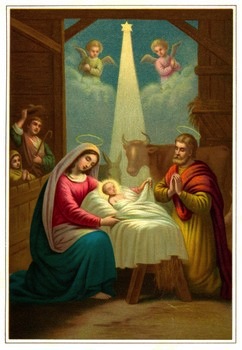
Knox Church Revives Berlioz Gem
(first published in the Cincinnati Enquirer Dec. 25, 2012)

A gem of the season shone again Sunday afternoon at Knox Presbyterian Church in Hyde Park.
And for only the third time in Cincinnati history, according to Earl Rivers, director of music at the church.
Rivers, tireless advocate for choral music in Cincinnati, led the Knox Choir, soloists and a chamber orchestra in Hector Berlioz’ oratorio “L’enfance du Christ” (“The Childhood of Christ”). It was two out of three for Rivers, recapping the local premiere he led at Knox 14 years ago (the only other performance to date was by the May Festival in 2007). Guest artist as King Herod was bass-baritone Kenneth Shaw, faculty artist at the University of Cincinnati College-Conservatory of Music.
Why the scarcity of performances for one of the French composer’s finest works? One reason, said Rivers, is the challenge of singing in French, a difficult language to pronounce, whether spoken or sung. Another might be the forces required. Though more intimate than “typical” for Berlioz (famed for his gargantuan Requiem and splashy “Symphonie fantastique”), there were over 80 performers, including a 34-piece orchestra (with tympani) filling the every inch of the chancel.
Berlioz called it a “sacred trilogy,” comprising “Herod’s Dream,” “The Flight into Egypt” and “The Arrival at Saïs.” Like Wagner, whom Berlioz influenced, it also partakes of music drama, with much of the storytelling done by the orchestra. (Both composers would be writing for films, if alive today.)
“Déjà les puissants tremblaient” (“already the mighty trembled”), sang tenor James Omstad as the Narrator, setting the scene for part I. A brisk march by the orchestra signaled Roman might, but it was a troubled Herod that Shaw sang, tortured by dreams of a king that would replace him. His aria was stern, angry and deeply emotional, as he called for soothsayers to interpret his dream. Their divinations, famously captured by the orchestra in a whirling, seven-beats-to-the-bar, hardens Herod’s resolve to order the slaughter of the newborn.
Part I does not end, however, until the scene shifts to the stable at Bethlehem, where Berlioz conjures the Holy Family in music of sublime beauty. Mezzo-soprano Theresa Merrill and baritone Jonathan Stinson, as Mary and Joseph, sang sweetly to the child, until interrupted by a choir of angels (sopranos at the rear of the church), warning them to flee into Egypt. It was a magical moment, indeed.
Berlioz composed part II of the oratorio first, passing it off under a pseudonym to fool critics used to his more “difficult” works, noted Rivers in remarks to the audience. The overture, with beautiful contributions by oboe and English horn (Mark Ostoich and Loren Berzsenyi), set a plaintive mood as the shepherds gathered to sing farewell to the Holy Family. The Knox choristers played their part splendidly, seeming to reflect the beauty of the church itself, decked in Christmas greenery.
Another well-loved portion of the work, “The Holy Family at Rest,” described in clarion tones by tenor Daniel Ross as the Narrator, ended with soft “Alleluias,” again from the angelic choir.
Part III brings the family into Egypt where they are refused assistance because they are Hebrews. The Good Samaritan is an Ishmaelite, affectively sung by bass Claude Cassion, who welcomes them into his home. It is also the occasion for a rare piece of chamber music by Berlioz, the Trio for Two Flutes and Harp, representing the young Ishmaelites performing to cheer their guests. Flutists Evelien Woolard and Heather Verbeck and harpist Michelle Gwynne, shone brightly here, their tones dancing off the walls of the church.
The oratorio ends with an Epilogue for Narrator (Daniel Ross) and Chorus reflecting on the meaning of the incarnation of Jesus, the humility to be felt by mankind and an injunction to universal love, sealed by soft, ethereal “Amens” sounded by the angelic choir, echoed by the full ensemble.
Rivers led the choir and audience in “Hark, the Herald Angels Sing” to bring the program and the event to a joyous conclusion.